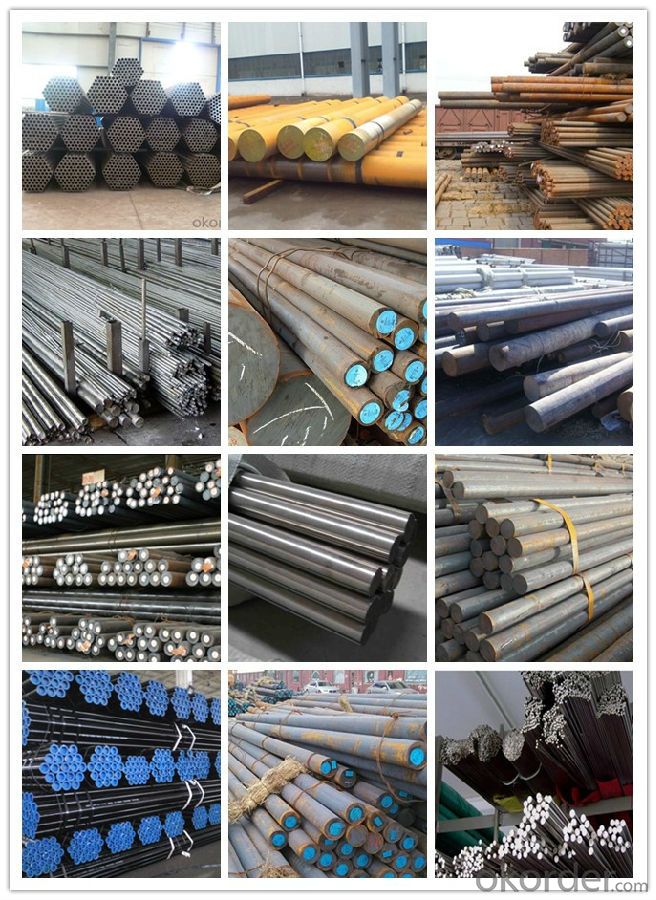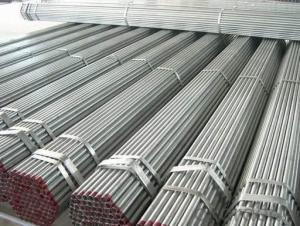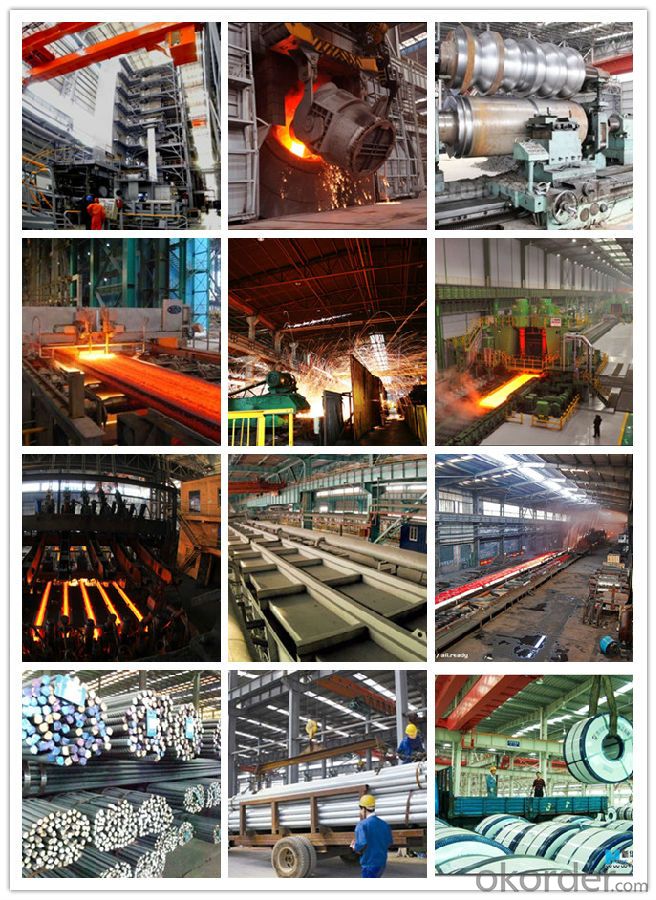Aisi 4140/42crmo4 Alloy Steel Round Bars
- Loading Port:
- China main port
- Payment Terms:
- TT or LC
- Min Order Qty:
- 25 m.t.
- Supply Capability:
- 10000 m.t./month
OKorder Service Pledge
OKorder Financial Service
You Might Also Like
Item specifice
Chemical composition in %:
C | Si | Mn | Cr | Mo | S |
0,38-0,45 | 0,10,0,40 | 0,60,0,90 | 0,90,1,20 | 0,15-0,30 | 0,020,0,040 |
Steel properties:
Grade of very common use, similar to 34 Cr Mo S 4, Cr Mp S 4, Steel grade 42 Cr Mo S 4 enables 100 MPa more to be achieved on the same sections than steel grade 34 Cr Mo S 4. Sometims used after surface hardening treatment.
Applications:
Parts for powertrain, shafts, press columns, axles of hydraulic jacks, pinions, annular gears,, bolting and screw rods for oil industry.
Mechanical properties:
Condition as supplied, annealed
Hardness: < 241 HB
condition as supplied, hardened and tempered
Ø | U.T.S. | Y.S.0.2% | Elongation | Elongation |
d < 16 | 1000-1300 | > 900 | > 10 | > 30 |
16 < 40 | 1000-1300 | > 750 | > 11 | > 35 |
40 < d < 100 | 900-1100 | > 650 | > 12 | > 35 |
100 < d < 160 | 800-950 | > 550 | > 13 | > 35 |
160 < d < 750 | 750-900 | > 500 | > 14 | > 35 |
250 < d < 500* | 690-840 | > 460 | > 15 | > 38** |
500 < d < 750* | 590-740 | > 390 | > 16 | > 38** |
Workshop show
Product show

- Q:Can special steel be used in electrical applications?
- Special steel can indeed find its use in electrical applications. There exist specific properties in special steel alloys, like stainless steel or tool steel, that render them appropriate for usage in electrical applications. These properties encompass excellent electrical conductivity, remarkable resistance against corrosion, and commendable strength. To illustrate, stainless steel frequently finds its application in electrical enclosures, wire mesh, and connectors, owing to its ability to ward off corrosion caused by moisture or chemicals. Conversely, tool steel is commonly employed in the production of electrical tools and equipment, such as pliers or screwdrivers, due to its superior strength and durability. On the whole, special steel alloys can provide the desired electrical properties and performance required for diverse electrical applications.
- Q:How does special steel contribute to the safety of infrastructure?
- Special steel plays a crucial role in enhancing the safety of infrastructure in various ways. Firstly, it offers exceptional strength and durability, allowing for the construction of robust and resilient structures. Whether it is used in bridges, buildings, or tunnels, special steel provides the necessary structural integrity to withstand extreme loads, such as heavy traffic, strong winds, seismic activities, or even potential terrorist attacks. Moreover, special steel possesses excellent corrosion resistance properties, making it suitable for infrastructure projects exposed to harsh environmental conditions. By preventing rust and decay, it extends the lifespan of structures and reduces the need for costly maintenance and repairs. This is especially important in coastal areas, where infrastructure is subjected to the corrosive effects of saltwater. In addition to its strength and corrosion resistance, special steel also offers exceptional fire resistance. It has a high melting point, which allows it to maintain its structural integrity under extreme temperatures. This characteristic is critical for infrastructure safety, as it provides additional time for evacuation and emergency response in case of a fire. Furthermore, special steel can contribute to the safety of infrastructure by enabling innovative design solutions. Its versatility allows for the creation of complex and efficient structures, such as long-span bridges or skyscrapers. These designs often incorporate special steel components, such as high-strength beams or columns, which enhance the overall stability and safety of the infrastructure. Overall, special steel's exceptional strength, corrosion resistance, fire resistance, and design flexibility make it an essential material for ensuring the safety and reliability of infrastructure. By utilizing special steel in construction projects, engineers and architects can create structures that can withstand various challenges, ultimately protecting the lives and well-being of the people who utilize them.
- Q:Can special steel be used in the plastic manufacturing industry?
- Yes, special steel can be used in the plastic manufacturing industry. Special steel alloys, such as tool steels, can be employed in the production of molds and dies used for shaping and forming plastic materials. These high-strength steels are essential for withstanding the high temperatures and pressures involved in plastic injection molding and other manufacturing processes. Special steel's durability and resistance to wear make it an ideal choice for enhancing the longevity and performance of plastic manufacturing equipment.
- Q:Is special steel suitable for manufacturing cutting tools?
- Cutting tools benefit greatly from the use of special steel, which is steel that has been specifically designed and processed to possess exceptional properties. This type of steel is known for its high hardness, toughness, and wear resistance. These characteristics make it an ideal choice for cutting tools, as they allow the tools to withstand the high stresses and pressures involved in cutting operations. The hardness of special steel ensures that cutting tools can maintain their sharpness for a longer period of time, resulting in improved cutting performance and efficiency. Furthermore, the toughness of special steel enables cutting tools to resist chipping, cracking, or breaking during use, enhancing their durability and longevity. In addition, the wear resistance of special steel ensures that cutting tools can endure the abrasive forces encountered during cutting operations without significant loss of material or deterioration. This helps to maintain the accuracy and precision of the cutting tools over time. Furthermore, special steel can be customized to meet specific requirements for different cutting applications. For instance, high-speed steel (HSS) is a type of special steel that is particularly suitable for cutting tools used in high-speed machining operations. HSS possesses excellent heat resistance and can retain its hardness even at elevated temperatures. In summary, special steel is highly suitable for manufacturing cutting tools due to its hardness, toughness, wear resistance, and ability to be tailored for specific cutting applications. These properties allow cutting tools to deliver optimal cutting performance, durability, and accuracy.
- Q:What are the different forming techniques for special steel?
- Some of the different forming techniques for special steel include hot forging, cold forging, extrusion, rolling, and casting. These techniques allow for the shaping and manipulation of the steel to meet specific requirements, such as strength, durability, and dimensional accuracy. Each technique has its own advantages and can be chosen based on the desired outcome and the characteristics of the special steel being used.
- Q:What are the common applications of special steel?
- Special steel has a wide range of applications in various industries. It is commonly used in the construction and automotive sectors for manufacturing components that require high strength, durability, and resistance to corrosion. Special steel is also utilized in the production of machinery and tools, such as cutting blades, drill bits, and gears, due to its excellent hardness and wear resistance. Additionally, it finds its application in the energy sector, particularly in the manufacturing of turbines, generators, and oil drilling equipment, where its high temperature and pressure resistance are vital.
- Q:How does special steel contribute to the electronics industry?
- Special steel plays a crucial role in the electronics industry by providing key components and materials that are essential for the manufacturing and performance of electronic devices. It is used in the production of various electronic components including connectors, circuit boards, sensors, and power transmission components, due to its exceptional properties such as high strength, excellent corrosion resistance, and thermal conductivity. Special steel also enables the miniaturization and increased efficiency of electronic devices, enhancing their overall performance and durability.
- Q:How does special steel perform in magnetic applications?
- Special steel, also known as stainless steel, generally performs well in magnetic applications. However, it is important to note that not all types of stainless steel are magnetic. The magnetic properties of special steel depend on its composition and the presence of certain elements such as nickel, manganese, and chromium. Austenitic stainless steel, which is the most common type, is non-magnetic due to its high nickel content. This makes it ideal for applications where magnetic interference is undesirable, such as in sensitive electronic devices or medical equipment. On the other hand, ferritic and martensitic stainless steels, which have lower nickel content, are magnetic. These types of special steel are commonly used in applications where magnetic properties are required, such as in magnetic separators, transformers, and electric motors. It is worth mentioning that the magnetic strength of stainless steel is relatively weak compared to other magnetic materials like iron or nickel. Therefore, if a strong magnetic field is needed, alternative materials may be more suitable. Overall, special steel can perform well in magnetic applications depending on the specific type and composition. It is important to consider the desired magnetic properties and consult with experts or refer to material specifications to ensure the appropriate selection for a particular application.
- Q:What are the properties of stainless tool steel?
- Stainless tool steel possesses several key properties that make it a popular choice for various applications. Firstly, it has excellent corrosion resistance, making it resistant to rust and staining. This property allows stainless tool steel to maintain its integrity and durability in harsh environments or when exposed to moisture. Additionally, stainless tool steel exhibits high hardness and wear resistance, enabling it to withstand heavy use and retain its sharpness for extended periods. It also has good toughness and impact resistance, ensuring it can handle intense forces without fracturing or breaking. These properties make stainless tool steel suitable for manufacturing tools and components used in industries such as automotive, aerospace, and cutlery.
- Q:How is leaded steel used in machining operations?
- Leaded steel is commonly used in machining operations due to its improved machinability. The addition of lead to the steel composition enhances its ability to be cut, drilled, and shaped with ease, reducing tool wear and improving surface finish. This type of steel is particularly useful in high-speed machining applications, where efficiency and precision are crucial.
1. Manufacturer Overview |
|
|---|---|
| Location | |
| Year Established | |
| Annual Output Value | |
| Main Markets | |
| Company Certifications | |
2. Manufacturer Certificates |
|
|---|---|
| a) Certification Name | |
| Range | |
| Reference | |
| Validity Period | |
3. Manufacturer Capability |
|
|---|---|
| a)Trade Capacity | |
| Nearest Port | |
| Export Percentage | |
| No.of Employees in Trade Department | |
| Language Spoken: | |
| b)Factory Information | |
| Factory Size: | |
| No. of Production Lines | |
| Contract Manufacturing | |
| Product Price Range | |
Send your message to us
Aisi 4140/42crmo4 Alloy Steel Round Bars
- Loading Port:
- China main port
- Payment Terms:
- TT or LC
- Min Order Qty:
- 25 m.t.
- Supply Capability:
- 10000 m.t./month
OKorder Service Pledge
OKorder Financial Service
Similar products
New products
Hot products
Related keywords
































